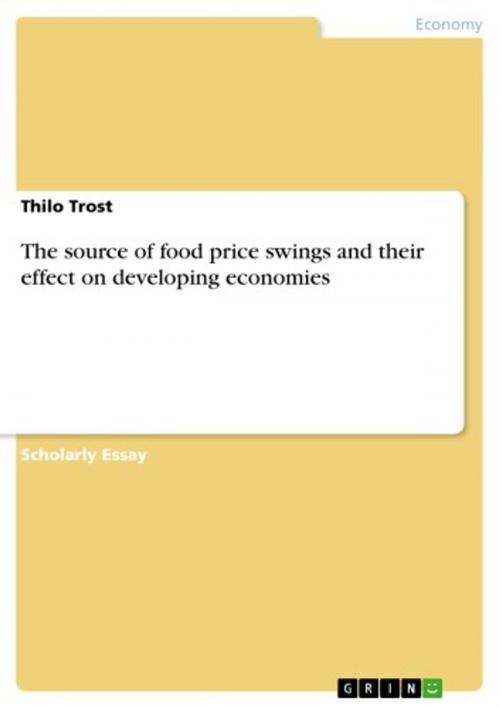The source of food price swings and their effect on developing economies
Business & Finance, Economics, Money & Monetary Policy| Author: | Thilo Trost | ISBN: | 9783656151777 |
| Publisher: | GRIN Verlag | Publication: | March 13, 2012 |
| Imprint: | GRIN Verlag | Language: | English |
| Author: | Thilo Trost |
| ISBN: | 9783656151777 |
| Publisher: | GRIN Verlag |
| Publication: | March 13, 2012 |
| Imprint: | GRIN Verlag |
| Language: | English |
Scientific Essay from the year 2012 in the subject Economics - Monetary theory and policy, grade: 1,3, Zeppelin University Friedrichshafen, language: English, abstract: In the following short paper, I am going to evaluate the economic effects of food price swings on emerging and developing economies. In recent years, we witnessed enormous increases and volatilities in commodity and especially food prices. Concerns of starvation are therefore strengthening. These economies tend to have a high percentage of food in their standardized consumption basket, which means they spend more of their income on food in general. Since food is an essential good of living, the recent price developments over the past ten years are threatening the social stability of these economies as well as the well-being of their inhabitants. In contrast to developed economies, the population of these relatively 'poor' economies is facing enormous problems feeding themselves and their children. This paper antends to give an answer to the extend of the pass-through effects of price increases to developing economies and the driving effects of those prices. In the first part of the paper I am going to give a short overview over recent price developments, then discuss the topic of influential factors on these prices, especially the extend which speculation has on aforementioned price in- and decreases. In the second part, I am going to eruate the pass-through effects of world food prices to developing economies as shown in the autumn study of the international monetary fund (hereinafter mentioned as IMF), namely what effect a 5% increase of food prices on international trade markets has on these economies, especially their output gap, and the foreign exchange value of the currency. The question to evaluate will not only be how price developments are created but also how they influence the economies and social stability of developing countries.
Scientific Essay from the year 2012 in the subject Economics - Monetary theory and policy, grade: 1,3, Zeppelin University Friedrichshafen, language: English, abstract: In the following short paper, I am going to evaluate the economic effects of food price swings on emerging and developing economies. In recent years, we witnessed enormous increases and volatilities in commodity and especially food prices. Concerns of starvation are therefore strengthening. These economies tend to have a high percentage of food in their standardized consumption basket, which means they spend more of their income on food in general. Since food is an essential good of living, the recent price developments over the past ten years are threatening the social stability of these economies as well as the well-being of their inhabitants. In contrast to developed economies, the population of these relatively 'poor' economies is facing enormous problems feeding themselves and their children. This paper antends to give an answer to the extend of the pass-through effects of price increases to developing economies and the driving effects of those prices. In the first part of the paper I am going to give a short overview over recent price developments, then discuss the topic of influential factors on these prices, especially the extend which speculation has on aforementioned price in- and decreases. In the second part, I am going to eruate the pass-through effects of world food prices to developing economies as shown in the autumn study of the international monetary fund (hereinafter mentioned as IMF), namely what effect a 5% increase of food prices on international trade markets has on these economies, especially their output gap, and the foreign exchange value of the currency. The question to evaluate will not only be how price developments are created but also how they influence the economies and social stability of developing countries.















